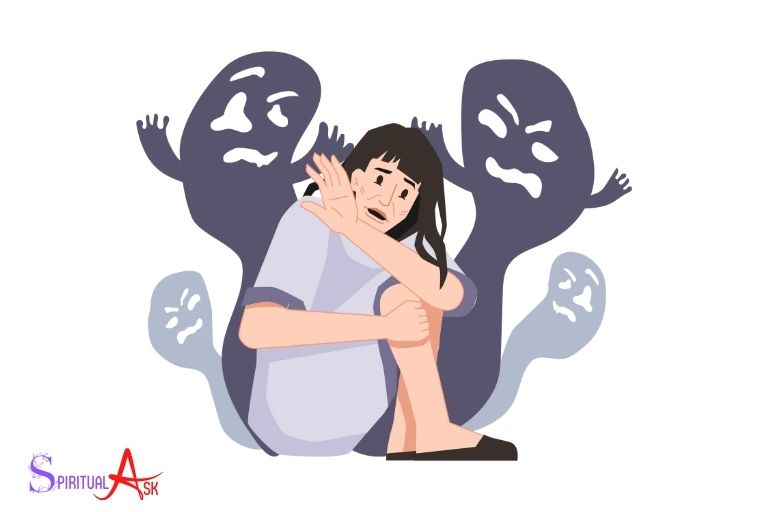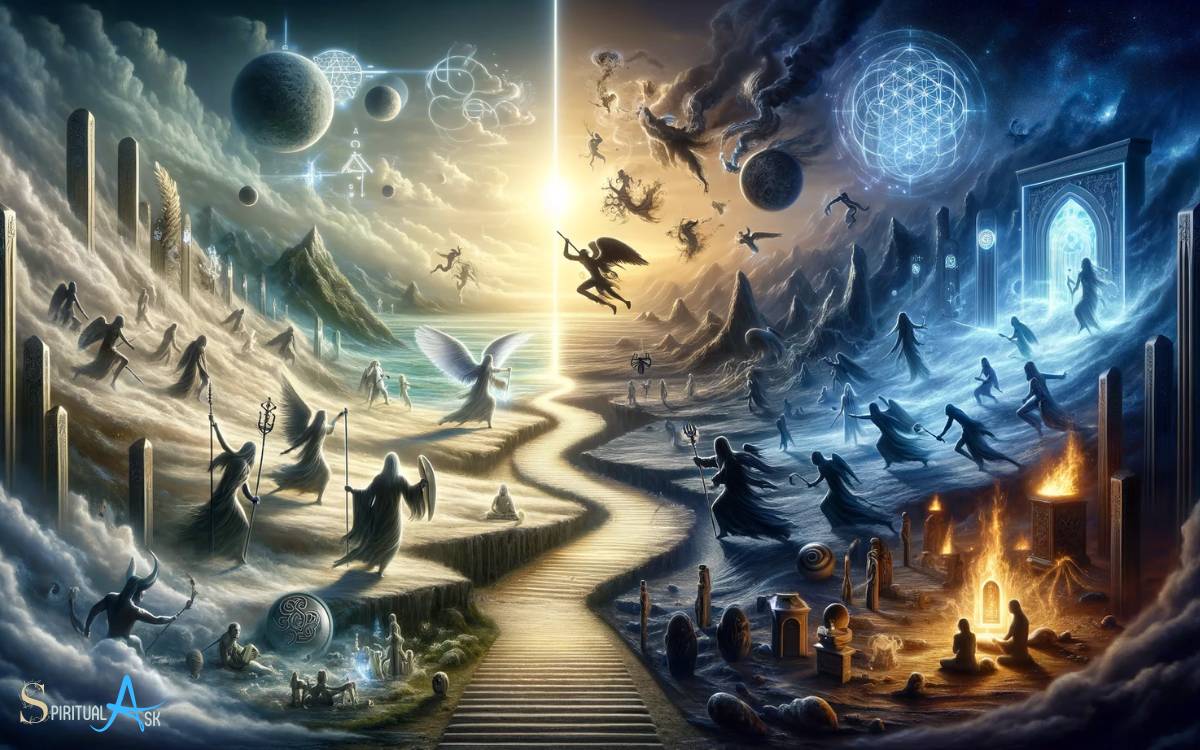Schizophrenia And Spiritual Warfare: Comparative Guide!
Schizophrenia and spiritual warfare are interconnected concepts in which the symptoms of schizophrenia, a mental disorder, are often attributed to spiritual influences or battles.
Schizophrenia is a severe mental disorder characterized by hallucinations, delusions, disorganized thinking, and other cognitive impairments.
On the other hand, spiritual warfare refers to the belief in a battle between good and evil forces, often involving demonic influences on individuals.
Some religious communities and individuals may view schizophrenia as a manifestation of spiritual warfare, where the person affected is experiencing a battle against demonic forces.
This perspective often neglects the medical and psychological aspects of the disorder, placing emphasis on spiritual intervention as the primary solution.
Schizophrenia and spiritual warfare are controversially linked, as some people may solely focus on spiritual factors rather than addressing the medical and psychological aspects of the disorder.
This can lead to stigma, misinformation, and inadequate treatment for those affected by schizophrenia, as they may not receive the evidence-based interventions necessary for managing their symptoms.
It is crucial to recognize schizophrenia as a complex mental health issue requiring a comprehensive approach, including medical, psychological, and, if appropriate, spiritual support.

Key Takeaway
Comparative Analysis of Schizophrenia and Spiritual Warfare
| Schizophrenia | Spiritual Warfare |
|---|---|
| Psychological disorder | Spiritual conflict |
| Symptoms: – Hallucinations – Delusions – Disorganized speech – Disorganized behavior – Negative symptoms | Effects: – Battle in the mind – Doubts about faith – Feeling oppressed – Experiencing temptation – Spiritual attacks |
| Medication & therapy | Prayer & spiritual guidance |
| Biological factors | Spiritual factors |
| No direct link to sin | Linked to sin and demonic influence |
Four Facts About: Schizophrenia and Spiritual Warfare
Understanding Schizophrenia
Schizophrenia is a complex, chronic mental health disorder characterized by disruptions in thought processes, perceptions, emotional responsiveness, and social interactions. It’s essential you understand its multifaceted nature.

Research shows that schizophrenia stems from a combination of genetic, brain chemistry, and environmental factors. Symptoms often include hallucinations, delusions, disorganized thinking, and significant social withdrawal, making daily functioning challenging.
It’s critical to recognize these signs early, as timely intervention can significantly impact the course of the disorder. Treatments typically involve a combination of antipsychotic medications and psychotherapy.
It’s a condition that requires a comprehensive, individualized approach, considering the patient’s specific needs and circumstances.
Understanding schizophrenia is the first step towards demystifying the disorder, paving the way for compassion, effective treatment, and support for those affected.
Concepts of Spiritual Warfare

While understanding schizophrenia provides a foundation in recognizing its clinical manifestations, exploring concepts of spiritual warfare introduces a different dimension to the discourse on mental health, particularly in how some cultures interpret symptoms and seek healing.
- Spiritual warfare often involves the belief that mental health symptoms are the result of demonic possession or spiritual attacks.
- Traditional healers may use rituals, prayers, or exorcisms as methods of treatment, which are believed to expel negative spiritual forces.
- The effectiveness of these spiritual interventions is subjective and varies widely among individuals and cultures.
- Clinical research into the intersection of spirituality and mental health is growing, aiming to understand how these beliefs affect outcomes for individuals with schizophrenia.
This analytical approach recognizes the complexity of interpreting and treating schizophrenia within diverse cultural and spiritual contexts.
Historical Perspectives
Throughout history, perceptions of schizophrenia have evolved significantly, influenced by cultural, religious, and scientific understandings.

Initially, societies interpreted symptoms of schizophrenia such as hallucinations and delusions through a supernatural lens, often attributing them to possession or divine punishment. This perspective led to treatments that were more spiritual and punitive than therapeutic.
As medical science advanced, particularly from the 19th century onwards, there was a shift towards viewing schizophrenia as a disorder of the mind.
This transition was grounded in emerging psychological and neurological research, which sought to understand the biological underpinnings and psychological dynamics of the condition.
Consequently, treatments evolved from exorcisms and isolation to incorporate psychotherapy and medication, reflecting a more compassionate and evidence-based approach to care.
Modern Interpretations
Reflecting on historical perspectives, we now explore modern interpretations of schizophrenia, emphasizing the latest scientific research and clinical findings.

Contemporary analysis sheds light on the neurological underpinnings and potential treatments of this complex condition.
You’ll find that:
- Advances in neuroimaging have illuminated the structural and functional brain anomalies in individuals with schizophrenia.
- Genetic studies highlight a strong hereditary component, revealing specific risk genes.
- Pharmacological treatments focus on managing symptoms, with a shift towards personalized medicine.
- Psychosocial interventions are recognized for their critical role in comprehensive care, supporting medication adherence and social functioning.
This evidence-based approach underscores a departure from earlier, more speculative theories, aiming to improve both understanding and outcomes for those affected by schizophrenia.
Navigating the Intersection

Exploring the intersection between modern scientific understanding and traditional beliefs about schizophrenia, we delve into how these perspectives can inform and enhance each other. It’s crucial to understand that integrating these views requires a nuanced approach.
| Perspective | Scientific Understanding | Traditional Beliefs |
|---|---|---|
| Nature of Illness | Biological disorder with genetic and environmental factors | Spiritual affliction or imbalance |
| Treatment Approaches | Medication, psychotherapy | Spiritual healing, rituals |
| Patient Care | Patient-centered, evidence-based care | Community and spiritual leader involvement |
| Outcomes Measured | Symptom reduction, improved function | Spiritual wellbeing, social integration |
This table underscores the complexity and potential for holistic care. It’s imperative to respect both viewpoints, fostering a comprehensive treatment plan that addresses the biopsychosocial and spiritual dimensions of schizophrenia.
Could the Spiritual Aspect of Mental Illnesses, like Eating Disorders, be Similar to that of Schizophrenia?
The spiritual aspect of mental illnesses, including eating disorders and schizophrenia, can indeed have overlapping elements, though they manifest differently.
Eating disorders and spirituality share a complex relationship, where spiritual turmoil might exacerbate or influence the manifestation of such conditions, similar to schizophrenia.
- Inner Conflict: Both can involve a profound inner struggle, which may be interpreted as a spiritual battle.
- Identity and Value: Issues of self-worth and identity, which are often central in spiritual discourse, can be key factors in these disorders.
- Seeking Control: Individuals might use eating behaviors or experience delusions as a way to exert control, reflecting a deeper spiritual or existential unrest.
- Healing and Support: Spiritual support, alongside medical intervention, can be crucial in the healing process for both conditions.
“Healing may not be so much about getting better, as about letting go of everything that isn’t you – all of the expectations, all of the beliefs – and becoming who you are.” – Rachel Naomi Remen
While the spiritual aspects can be similar, it’s essential to approach each individual and their condition with a tailored, holistic understanding that considers their unique physical, mental, and spiritual needs.
Conclusion
In the grand cosmic boxing ring, schizophrenia and spiritual warfare have been duking it out, with humanity caught in the crossfire. You’ve seen the historical roundabouts and modern twists, dissected through a clinical lens sharper than a demon’s pitchfork.
Remember, navigating this maze requires more than a sprinkle of holy water or a prescription pad. It’s a tightrope walk above a pit of misconceptions, where balancing evidence and empathy is the only way to avoid falling into the abyss of ignorance.
FAQ About Schizophrenia And Spiritual Warfare
What Are The Symptoms Of Schizophrenia?
Symptoms include delusions, hallucinations, disorganized speech and behavior, and negative symptoms.
Can Schizophrenia Be Caused By Spiritual Warfare?
There is no scientific evidence to support the idea that schizophrenia is caused by spiritual warfare.
How Is Schizophrenia Typically Treated?
Schizophrenia is usually treated with antipsychotic medications, therapy, and support from loved ones.
How Can Spirituality Be Incorporated Into Schizophrenia Treatment?
Spirituality can be incorporated into treatment through prayer, meditation, and working with a spiritual advisor. It is important to find a balance between spiritual practices and evidence-based treatment methods.






